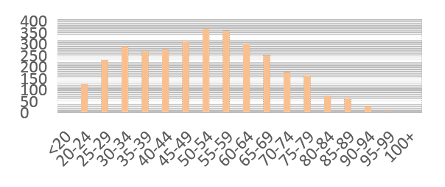News from the ECG, 2022 Chair's report
In 2022, the ECG saw the return to in person events, although hybrid meetings and webinars continue, allowing us to reach a diverse audience. We now meet as a committee both in person and online, to lower our environmental impact and increase our geographic diversity.
The ECG is pleased to welcome four new committee members: Dr Kiri Rodgers (University of the West of Scotland), whose interests lie in geochemistry, and has been contributing to our diversity initiatives; Symiah Barnett (Loughborough University), who works on plastics pollution, and has previously contributed to our outreach efforts; Dr Sebastian Diez (University of York) is an atmospheric chemist, and made a major contribution to the organisation of #EnvChem2022 this year; Dr Helena Rapp Wright (Imperial College London), studies drug analysis in water, and joins the committee after speaking at #EnvChem2021, and supporting #EnvChem2022. In addition, Niall Marsay, Cranfield University, has been co opted onto the committee to act as Outreach Lead, representing us at IF Oxford 2022.
We say goodbye to our secretary, Professor Steve Leharne (University of Greenwich), who leaves after seven years, during which time he commissioned the Bulletin Briefs acted as an editor, organised numerous events, and acted as an extremely organised Secretary. Professor Dominik Weiss (Imperial College London), our Bulletin production editor and DGL co-convenor leaves after five years of service. Laura Alcock takes on the position of Secretary, David Owen Briefs co-ordinator, and Caroline Gauchotte Lindsay production editor and Vice Chair. Dr Roger Reeve, after 16 years’ service and a year-long handover, joins us for the last time in March. His contributions have included establishing event series such as Analysis of Complex Matrices and Bulletin editing.
In 2022, the committee organised five events, including our flagship events #EnvChem2022 (hybrid) and the Distinguished Guest Lecture Disposable Attitude: Electronics in the Environment (in person, pp. 5-7, 22-29). We ran two webinars, 3B’s in Circular Economy (7th September) jointly with the Management Group, and Plastics: Cradle to Grave and Resurrection III (15th June) with RSC Toxicology, and Food Groups, and the Society of Chemical Industry, led by Innovate UK Knowledge Transfer Network – a recording is available. Circular Chemistry; the enabler to help solve global challenges (hybrid) ran joint with the Applied Materials Chemistry Group and DEFRA (30th November) (pp. 8-10), and the ECG attended three outreach events. Unfortunately,
our popular event State of the Art in the Analysis of Complex Environmental Matrices was cancelled due to rail strikes, but is replaced by a series of seminars to take place in January and February 2023 (p. 32).
Overall events:
• ~250 attendees
• ~150 meaningful outreach engagements
• 51 oral presentations
• 2 round table discussions
• 23 posters
The ECG is pleased to welcome four new committee members: Dr Kiri Rodgers (University of the West of Scotland), whose interests lie in geochemistry, and has been contributing to our diversity initiatives; Symiah Barnett (Loughborough University), who works on plastics pollution, and has previously contributed to our outreach efforts; Dr Sebastian Diez (University of York) is an atmospheric chemist, and made a major contribution to the organisation of #EnvChem2022 this year; Dr Helena Rapp Wright (Imperial College London), studies drug analysis in water, and joins the committee after speaking at #EnvChem2021, and supporting #EnvChem2022. In addition, Niall Marsay, Cranfield University, has been co opted onto the committee to act as Outreach Lead, representing us at IF Oxford 2022.
We say goodbye to our secretary, Professor Steve Leharne (University of Greenwich), who leaves after seven years, during which time he commissioned the Bulletin Briefs acted as an editor, organised numerous events, and acted as an extremely organised Secretary. Professor Dominik Weiss (Imperial College London), our Bulletin production editor and DGL co-convenor leaves after five years of service. Laura Alcock takes on the position of Secretary, David Owen Briefs co-ordinator, and Caroline Gauchotte Lindsay production editor and Vice Chair. Dr Roger Reeve, after 16 years’ service and a year-long handover, joins us for the last time in March. His contributions have included establishing event series such as Analysis of Complex Matrices and Bulletin editing.
In 2022, the committee organised five events, including our flagship events #EnvChem2022 (hybrid) and the Distinguished Guest Lecture Disposable Attitude: Electronics in the Environment (in person, pp. 5-7, 22-29). We ran two webinars, 3B’s in Circular Economy (7th September) jointly with the Management Group, and Plastics: Cradle to Grave and Resurrection III (15th June) with RSC Toxicology, and Food Groups, and the Society of Chemical Industry, led by Innovate UK Knowledge Transfer Network – a recording is available. Circular Chemistry; the enabler to help solve global challenges (hybrid) ran joint with the Applied Materials Chemistry Group and DEFRA (30th November) (pp. 8-10), and the ECG attended three outreach events. Unfortunately,
our popular event State of the Art in the Analysis of Complex Environmental Matrices was cancelled due to rail strikes, but is replaced by a series of seminars to take place in January and February 2023 (p. 32).
Overall events:
• ~250 attendees
• ~150 meaningful outreach engagements
• 51 oral presentations
• 2 round table discussions
• 23 posters
|
Our website has also seen nearly 11,000 unique visits January-October 2022, including a spike of interest in April, which may be the result of a school project! Most (~93%) of viewers come through Google, and our most popular page is a 2007 article on climate change, methane and ozone, followed by Environmental Briefs.
|
|
A survey of our 2022 membership has shown that ECG has 3,248 members, representing all ages, including one member over 100(!). The gender breakdown is 69% male, 30% female, and 0.2% non-binary – in line with RSC general membership data (1). Results also show that members tend to maintain their commitment to the ECG for decades – two for between 76 and 80 years.
|
References
1. Day, A. E., Corbett P. , Boyle J. (2020). Is there a gender gap in chemical sciences scholarly communication? Chemical science, 11, 2277-2301. https://doi.org/ 10.1039/C9SC04090K
1. Day, A. E., Corbett P. , Boyle J. (2020). Is there a gender gap in chemical sciences scholarly communication? Chemical science, 11, 2277-2301. https://doi.org/ 10.1039/C9SC04090K



